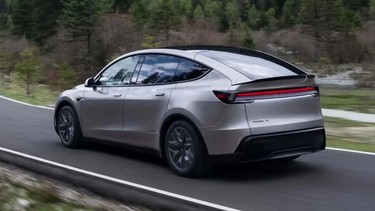Technology
Tesla’s Model Y L Launches in China as U.S. Production Uncertain

Tesla has introduced the Model Y L, a long-wheelbase variant of its popular electric SUV, in China. This model can seat up to six passengers and features a wheelbase that is 150 mm (5.9 inches) longer than the standard Model Y. The vehicle is priced at ¥339,000, equivalent to approximately $65,600 in Canadian dollars, marking a premium of ¥26,000 over the regular version.
Elon Musk, CEO of Tesla, has suggested that whether this version will be available in the United States remains uncertain. In a recent post on X, Musk stated, “This variant of the Model Y doesn’t start production in the US until the end of next year. Might not ever, given the advent of self-driving in America.” His comments have sparked speculation about the company’s focus and the future of personal vehicle ownership in an era of potential automated driving.
While Musk’s statement raises questions, it hints at a possible shift in Tesla’s strategy. Industry observers are eager to understand whether Musk prioritizes the development of autonomous driving technologies over expanding the vehicle lineup for family-oriented consumers. This is particularly intriguing given Musk’s previous discussions on population decline and the need for larger family vehicles.
The Model Y has been a significant success for Tesla, ranking as the best-selling vehicle globally in 2023, outperforming the Toyota RAV4 by 150,000 units. However, the RAV4 regained its top position in 2024, leading by only 2,000 vehicles. The Model Y is set to receive a facelift for 2026 in North America, which will include design updates and interior enhancements following its recent introduction in China.
As Tesla navigates these developments, it faces declining sales figures. In the first quarter of 2025, the company reported a staggering 70% drop in profits, with a significant portion of earnings originating from sales of emissions credits to other manufacturers. Furthermore, competition in the electric vehicle market is intensifying, as evidenced by General Motors surpassing Tesla as Canada’s leading electric vehicle seller.
Despite some positive trends, Tesla’s sales in Europe have also seen a decline. The European Automobile Manufacturers’ Association reported that Tesla sold 70,655 units in the European Union during the first half of 2025, a decline of 43.7% compared to the same period in the previous year. In contrast, sales surged in Norway by 83.4%, while they fell by 55.1% in Germany, despite an overall increase in electric vehicle purchases in that market.
The Model Y L features advanced technology, including an infotainment system capable of recognizing voice commands through the phrase “Hey, Tesla.” This system can identify which passenger issued the command, allowing for personalized responses while preventing backseat passengers, particularly children, from taking control.
Tesla is also reportedly considering a more affordable version of the Model Y, which would be smaller and equipped with fewer features, as well as a smaller variant of the Cybertruck aimed at markets with different size preferences. Yet, past announcements of new models, such as the Model 2 and the Roadster, have created skepticism about future releases.
In light of these developments, Tesla continues to adapt to a rapidly changing automotive landscape. The company’s strategy regarding family vehicles, production timelines, and the integration of autonomous technology will be closely watched as it seeks to maintain its position in an increasingly competitive market.
-

 World3 months ago
World3 months agoScientists Unearth Ancient Antarctic Ice to Unlock Climate Secrets
-

 Entertainment3 months ago
Entertainment3 months agoTrump and McCormick to Announce $70 Billion Energy Investments
-

 Lifestyle3 months ago
Lifestyle3 months agoTransLink Launches Food Truck Program to Boost Revenue in Vancouver
-

 Science3 months ago
Science3 months agoFour Astronauts Return to Earth After International Space Station Mission
-

 Technology2 months ago
Technology2 months agoApple Notes Enhances Functionality with Markdown Support in macOS 26
-

 Top Stories1 week ago
Top Stories1 week agoUrgent Update: Fatal Crash on Highway 99 Claims Life of Pitt Meadows Man
-

 Sports3 months ago
Sports3 months agoSearch Underway for Missing Hunter Amid Hokkaido Bear Emergency
-

 Politics2 months ago
Politics2 months agoUkrainian Tennis Star Elina Svitolina Faces Death Threats Online
-

 Technology3 months ago
Technology3 months agoFrosthaven Launches Early Access on July 31, 2025
-

 Politics3 months ago
Politics3 months agoCarney Engages First Nations Leaders at Development Law Summit
-

 Entertainment3 months ago
Entertainment3 months agoCalgary Theatre Troupe Revives Magic at Winnipeg Fringe Festival
-

 Politics1 week ago
Politics1 week agoShutdown Reflects Democratic Struggles Amid Economic Concerns



















